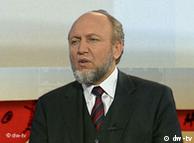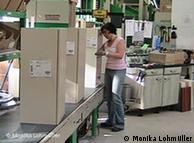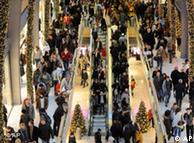BUSINESS | 24.11.2011
German business confidence is once more on the rise
Germany's closely-watched index on business confidence issued by the Munich-based ifo Institute on Thursday bucked the downward trend of the previous four months by rising slightly to 106.6 in November.
That is a whisker higher than the 106.4 recorded in October and surprised analysts who had been predicting that the global slowdown had already damaged confidence in what is the world's fourth largest economy.
The ifo verdict triggered a brief rebound on European share markets on Thursday. Hours later, though, Frankfurt's DAX index dropped back below the 5,500 level to deliver a ninth consecutive day of losses after Chancellor Angela Merkel again rejected a European Commission plan to set up eurobonds.
German economy defies trend
 Hans-Werner Sinn reads Germany's economic pulse"The German economy is still performing relatively well despite the international turmoil," said ifo president Hans-Werner Sinn.
Hans-Werner Sinn reads Germany's economic pulse"The German economy is still performing relatively well despite the international turmoil," said ifo president Hans-Werner Sinn.The survey's data, gleaned from 7,000 companies, including manufacturers, retailers and wholesalers, coincided with a batch of third-quarter data from the Federal Statistics Office. That showed that Germany's gross domestic product expanded by 0.5 percent between July and September. Private spending rose by 0.8 percent. That is the second highest jump in private consumption since 2007.
Also recorded were slight increases in capital investment and government spending, plus a 2.5 percent quarterly rise in exports offset by a 2.6 rise in imports, culminating in a year-on-year overall growth rate for Germany's economy of 2.5 percent. The only weak trend was in Germany's building sector.
Order books contradict global mood
"The companies are doing well, despite all the lamentations," said Gertrud Traud, the chief economist at regional state bank Helaba.
"Orders are still being placed, and many firms are happy, even if the rate of ordering is a little less than before, because they were already working at capacity."
The firms have also been able to benefit from low borrowing rates in Germany. Recently, the European Central Bank reduced its wholesale rate to 1.25 percent.
Another optimist is Unicredit economist, Andreas Rees. "'Although we believe that private consumption plus investment by firms will not offset declines in the export sector, they do offer a safety net," he said.
Caution remains
Norbert Irsch, the chief economist of Germany's state-own investment promotion bank KfW is more cautious. He fears recession in Germany unless a convincing way to overcome the eurozone's debt crisis is found within the first quarter of 2012.
If that does not happen, he says, "it will be difficult to break out of a vicious circle of declining trust, increasing tentativeness and sinking demand."
Another ifo expert Klaus Abberger said he is not surprised that assessments of the situation are contradictory. Domestic consumer demand has a stabilizing effect, but, in the light of the international financial crisis he said, "We can't split ourselves off from the world."
Author: Ian P. Johnson (dpa, AP)
Editor: Michael Lawton
Editor: Michael Lawton
dw




No comments:
Post a Comment